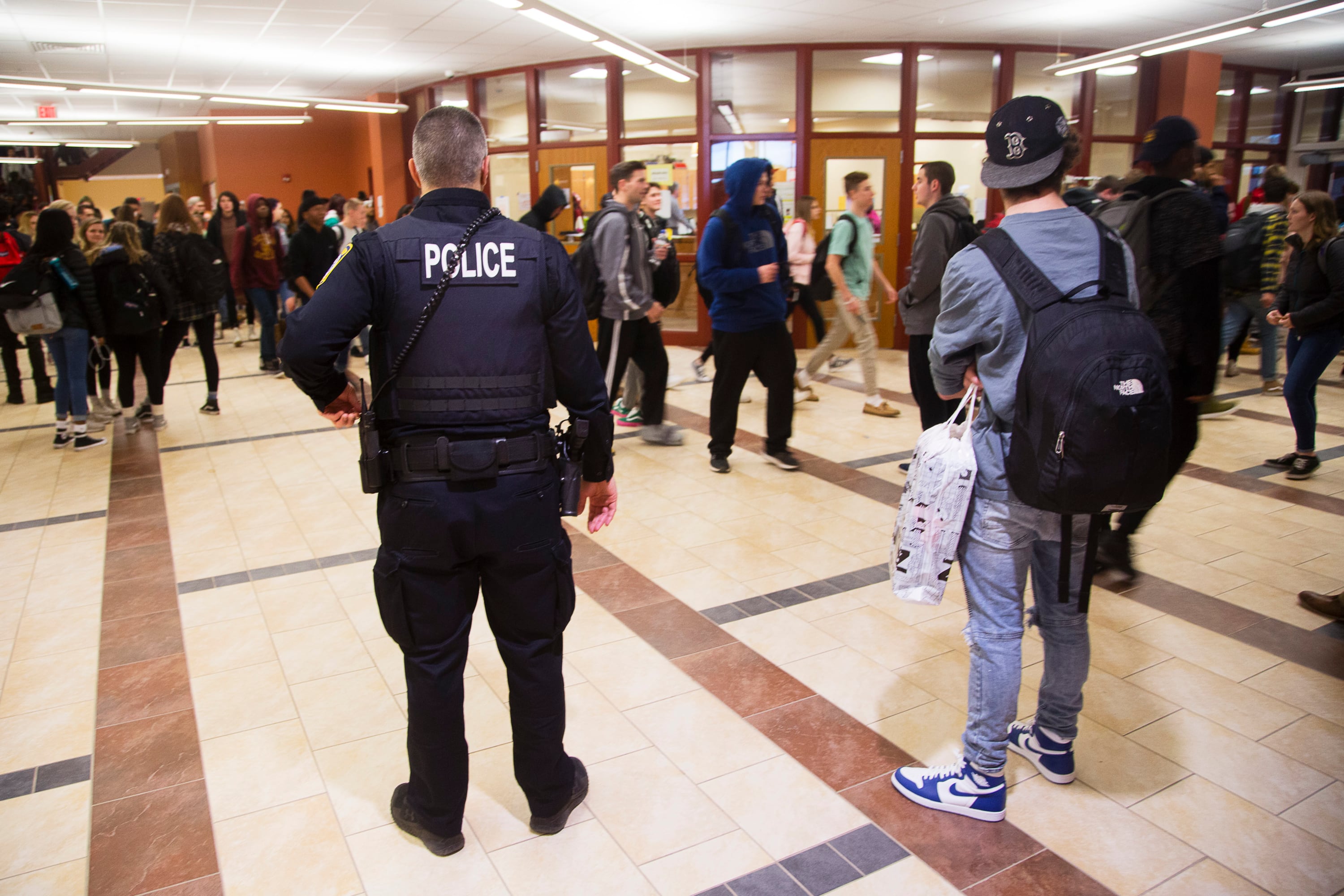Last week, as widespread protests continued over the police killing of George Floyd, the Minneapolis school board voted unanimously to end its contract with the local police department.
Since then, school officials elsewhere have moved in a similar direction. A majority of Denver school board members say they’ll support a measure to remove police from the district’s schools by the end of the year. And the superintendent of Portland’s public schools has said he will discontinue his district’s school police program.
That group could grow as students, educators, and activists across the country — from Seattle to Chicago to Houston to New York City — put pressure on their own school districts to do the same.
As school districts look to cut ties with local law enforcement, they’ll be wrestling with some big questions about what their school safety plans should look like now — especially whether they should replace police officers with other security staff or something else entirely.
Part of the challenge of trying something new, advocates say, is that the alternatives aren’t as widespread. All 25 of the nation’s largest school districts have sworn police officers in at least some schools, and 10 run their own police forces, according to their websites. Nationwide, more than half of all public schools had sworn law enforcement officers present at least once a week during the 2017-18 school year, federal data show.
“Definitely, that is one of the challenges ... to try to get this radical imagining of what could be,” said Letha Muhammad, who directs the Education Justice Alliance, a North Carolina group that’s advocating for the removal of school resource officers from Wake County schools. “For systems, especially like a public school system, I get it, that it could be a scary idea to be the one to step out and do something different.”
What are the alternatives to school police?
School resource officers, the most common type of sworn law enforcement in schools, have arresting capabilities, but their training and whether they’re supposed to be involved in student discipline varies widely across the country. In recent years, there have been calls to better train these officers, to move their duties away from punishing students, and to more clearly define their roles.
Some schools also employ security staff, who aren’t police officers but in some cases are armed. If more school districts move away from police in schools, they could end up relying more on people in those roles.
In Minneapolis, officials have already said the new safety plan they’re developing will include security staff. Similarly, in Denver, the resolution under consideration to remove police wouldn’t get rid of the district’s 100 armed and unarmed campus security officers. And after Jefferson County schools in Kentucky cut ties with law enforcement last year, they considered using armed security even before the state passed a law requiring armed school resource officers in every school.
That’s not enough of a shift for some.
“The problem is that the security staff tend to start doing the same thing,” said Judith Browne Dianis, who heads the Advancement Project, a civil rights group that’s calling for all districts to cut ties with local law enforcement. “We have to be creative. Listen to young people ... and hear what makes them safe.”
One concrete idea advocates have put forward is to overhaul school police and school security roles, turning them into jobs held by unarmed staffers focused on conflict resolution.
The Black Organizing Project in Oakland released a plan last year calling for the Oakland school district to bring its school safety and security program under the district’s equity or behavioral health department. The group suggested rewriting the titles and job descriptions of security personnel to focus on peace-keeping and school climate, and the plan acknowledges that many of those currently in school security roles are people of color with roots in the community.
Those staffers could undergo a new training program focused on de-escalating conflicts, trauma-informed practices, and reducing racial bias, and become part of larger special education or behavioral health teams, the plan says.
One Oakland school board member plans to introduce a measure this week to dissolve the district’s internal police force and replace it with these “peace-keeping ambassadors.”
This idea has had some resonance elsewhere. In North Carolina, Muhammad says she’s been talking with Wake County school officials over the last year about piloting a “peacebuilders” program in the district’s middle schools. That would put a team of interventionists in charge of student discipline issues.
School officials said last week they didn’t plan to end the district’s school resource officer program. But two school board members asked about the peacekeeper idea at a recent meeting, something Muhammad saw as progress in the wake of the Floyd protests.
“They haven’t necessarily agreed with us in the removal of school resource officers, but they’re interested in the alternative model that we’re lifting up,” Muhammad said.
Continued calls to reform school police
Calls to overhaul school policing often include federal data that show students who attend schools with law enforcement officers are more likely to be arrested, and that black students are arrested or referred to law enforcement at school at disproportionately high rates.
Some say those issues could be addressed by investing in better training for officers and better defining their role in schools through agreements between districts and local law enforcement — something many districts lack.
Mo Canady, the head of the National Association of School Resource Officers, for example, wants to see schools provide more training on things like de-escalation and mental health, topics his organization covers in paid trainings.
“I’m not suggesting that there aren’t places and communities where that role of school-based police is not being done in a proper way,” Canady said, noting that his organization didn’t train officers in Minneapolis or Denver. “If there are truly problems with their school-based programs, I think it would be more wise to try and fix those, as opposed to just throwing them out.”
But students like 16-year-old Reagan Razon, who is African American, say better training won’t solve the issue.
“At the end of the day, he’ll still have the badge and the police car, and students will still feel unsafe based off of past experiences with police officers,” said Razon, who helped start a petition to remove school resource officers from Wake County schools. She’s gathered examples of school resource officers who have tased, pepper sprayed, or pinned down and arrested students in her district, including at her magnet high school in Raleigh. “That just creates a whole unhealthy environment in the school.”
One big obstacle for those fighting to remove police from schools in recent years has been a rising national concern about school safety in the wake of high-profile school shootings, particularly in Newtown, Connecticut and Parkland, Florida. That’s caused some states, including Florida, to pass laws that require schools to have armed security.
But there are some indications that school districts may listen more closely to what students like Razon want to see this time. One reason is the new momentum following Floyd’s death in Minneapolis, which has sparked national conversations about the connection between discriminatory policing in neighborhoods and schools. Another is that many schools will be facing tight budgets in the fall, which could prompt some districts to reconsider spending on security.
“In some ways, this is a response to the times we’re in,” said F. Chris Curran, an associate professor at the University of Florida who’s studied school discipline and safety. “Part of it is a response to, and acknowledgement of, police violence, particularly on communities of color. It’s also a reflection of budgetary constraints that have been brought about from the economic fallout of the COVID crisis.”







